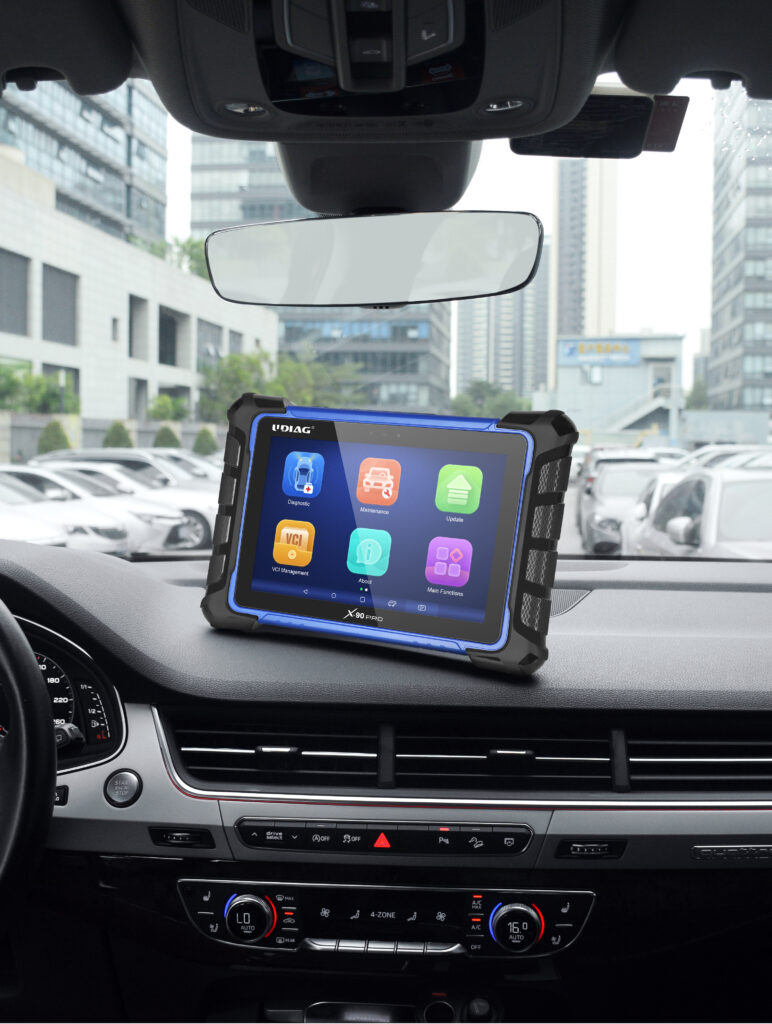Do car diagnostic tablets work with electric or hybrid vehicles?
2024-04-01 by UDIAG
In the evolving landscape of automotive technology, the advent of electric and hybrid vehicles has revolutionized the way we perceive transportation. Alongside these advancements, diagnostic tools have become indispensable in ensuring the efficient operation and maintenance of modern vehicles. In this essay, we delve into the compatibility of car diagnostic tablets with electric and hybrid vehicles, assessing their effectiveness in diagnosing and troubleshooting these innovative automobiles.

I. Overview of Car Diagnostic Tablets
Car diagnostic tablets are sophisticated handheld devices designed to communicate with a vehicle’s onboard computer systems. They offer a comprehensive range of features, including reading and clearing diagnostic trouble codes (DTCs), monitoring real-time data streams, and conducting system tests. These tablets serve as invaluable assets for automotive technicians, providing them with insights into a vehicle’s health and performance.
II. Electric and Hybrid Vehicles
An Overview: Electric and hybrid vehicles represent a paradigm shift in automotive engineering, featuring advanced drivetrain and powertrain configurations. Electric vehicles (EVs) rely solely on electric motors for propulsion, whereas hybrid vehicles combine internal combustion engines with electric motors. These vehicles incorporate intricate systems such as regenerative braking, battery management, and motor controllers, necessitating specialized diagnostic procedures.
III. Challenges in Diagnosing Electric and Hybrid Vehicles
Diagnosing electric and hybrid vehicles poses unique challenges due to their complex systems and components. Traditional diagnostic methods may not suffice in identifying issues related to electric drivetrains and high-voltage systems. Moreover, the integration of software and hardware in these vehicles requires diagnostic tools to be adept at interpreting intricate data streams accurately.
IV. Compatibility of Car Diagnostic Tablets with Electric and Hybrid Vehicles
Several car diagnostic tablets on the market claim compatibility with electric and hybrid vehicles. These tablets typically offer enhanced functionalities tailored to the specific needs of electric and hybrid vehicle diagnostics. Features such as battery health monitoring, electric motor analysis, and high-voltage system diagnostics cater to the intricate requirements of these vehicles.
V. Advantages and Limitations of Car Diagnostic Tablets for Electric and Hybrid Vehicles
The use of car diagnostic tablets presents numerous advantages for diagnosing electric and hybrid vehicles. These include rapid identification of faults, precise data analysis, and improved troubleshooting efficiency. However, limitations such as compatibility issues with certain vehicle models and the need for specialized training to interpret diagnostic results may hinder their effectiveness.
VI. Case Studies and Examples
Real-world case studies illustrate the practical application of car diagnostic tablets in diagnosing electric and hybrid vehicles. Successful utilization of these tools has led to expedited repair times, reduced downtime, and enhanced customer satisfaction. Nevertheless, challenges encountered during diagnostics underscore the importance of continuous innovation and refinement in diagnostic technologies.
VII. Future Trends and Developments
As electric and hybrid vehicles continue to proliferate, the demand for advanced diagnostic solutions will rise correspondingly. Future developments in car diagnostic tablets may include enhanced compatibility with emerging vehicle technologies, integration of artificial intelligence for predictive diagnostics, and seamless connectivity with cloud-based diagnostic platforms.
Conclusion
In conclusion, car diagnostic tablets play a crucial role in diagnosing and maintaining electric and hybrid vehicles. Their compatibility with these innovative automobiles signifies a significant milestone in automotive diagnostics. While challenges persist, the continued evolution of diagnostic technologies promises to empower automotive technicians in effectively addressing the complexities of electric and hybrid vehicle systems.
FAQs
1. Are car diagnostic tablets compatible with all electric and hybrid vehicles?
Car diagnostic tablets vary in their compatibility with different vehicle models. While many claim to support electric and hybrid vehicles, it’s essential to verify compatibility with specific make and model before use.
2. What are the key features to look for in a car diagnostic tablet for electric and hybrid vehicles?
Look for features such as battery health monitoring, electric motor analysis, high-voltage system diagnostics, and compatibility with proprietary electric and hybrid vehicle protocols.
3. Can car diagnostic tablets detect all potential issues in electric and hybrid vehicles?
While car diagnostic tablets can identify many common issues, they may not detect all problems, especially those related to highly specialized components or software glitches. Human expertise and additional diagnostic tools may be necessary for comprehensive evaluation.
4. Do I need specialized training to use a car diagnostic tablet for electric and hybrid vehicles?
While basic automotive diagnostic knowledge is helpful, some tablets may require specific training or familiarity with electric and hybrid vehicle systems. Manufacturers often provide training materials or certification programs for users.
5. Can car diagnostic tablets reset warning lights in electric and hybrid vehicles?
Yes, many car diagnostic tablets can reset warning lights and clear diagnostic trouble codes (DTCs) in electric and hybrid vehicles, provided the underlying issue has been addressed. However, it’s crucial to address the root cause of the problem to prevent recurring issues.


